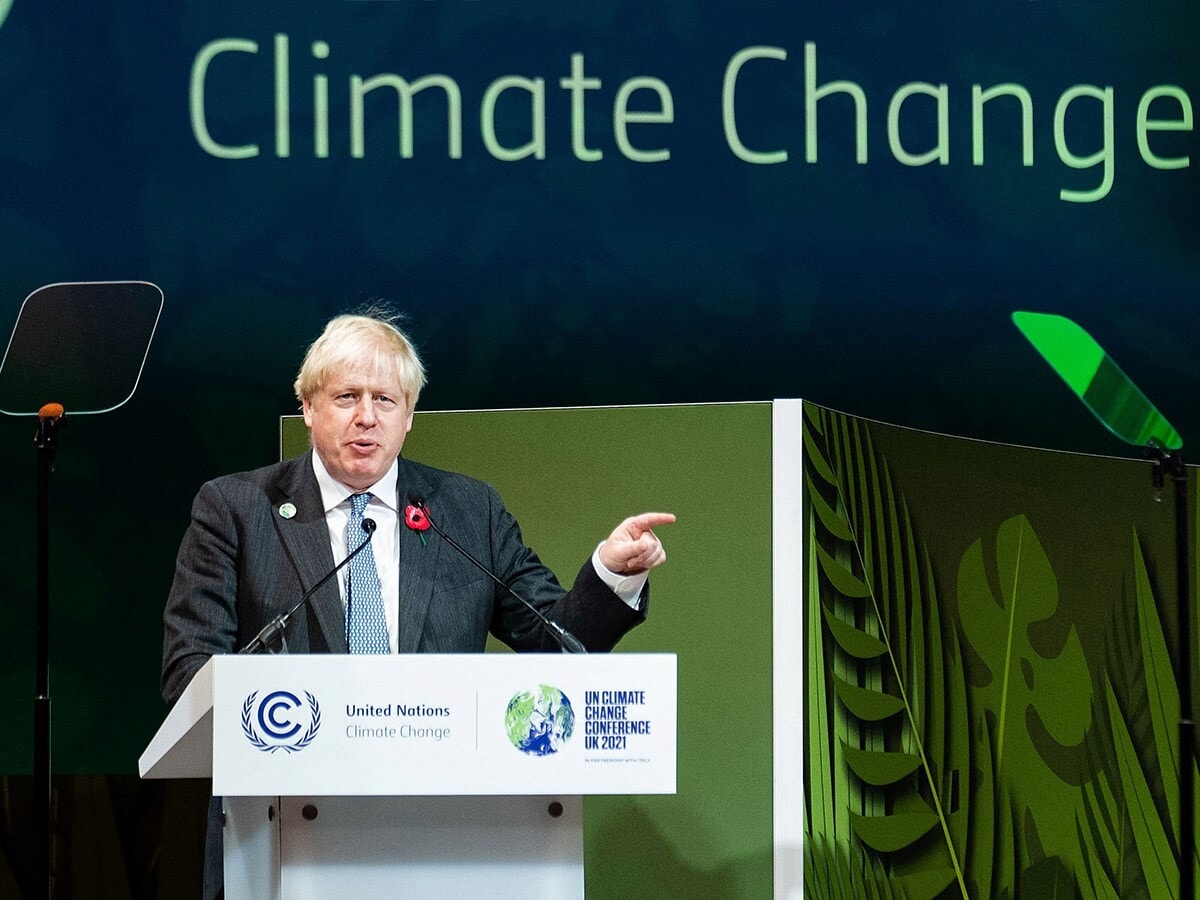Governments and corporates are increasing the pace towards net-zero carbon limits to tackle global warming. What new regulations will business around the world face in 2022?
New regulations for buildings in England
In England next year new homes and buildings will have to produce 30% less CO2 than current standards, with offices and shops having to reduce emissions by 27%. This will be achieved by utilising low-carbon technology such as solar panels and heat pumps. According to the UK government led by prime minister Boris Johnson (pictured above), these regulations are necessary as housing and powering buildings accounts for about 40% of the country’s total energy use. The new building regulations will come into effect from June next year and will particularly impact major UK housebuilders such as Taylor Wimpey [TW.L], Bellway [BWY.L] and Redrow [RDW.L]. Taylor Wimpey’s share price could be the most vulnerable, given that it was criticised by green watcher Unearthed earlier this year for calling government new build proposals “too demanding”.
New homes in England must have electric car charging points from 2022
It will also be compulsory for new buildings across England to have electric car charging points next year. This could lead to the creation of 145,000 new charging points per year, giving a boost to EV stocks such as Tesla [TSLA], as well as traditional car makers ramping up their green vehicles such as Ford [F].
Germany continues phase out of coal power
The German government wants to reduce the country’s total coal power capacity down to 30GW by the end of 2022, from around 38GW in 2020. As such, the phasing out of hard coal plants in tenders and lignite plants in a fixed order will gather pace. Stocks this will impact include energy company RWE [RWE.DE], which is Germany’s largest individual source of greenhouse gas emissions, according to Clean Energy Wire. In addition, December 2022 will mark the closure of Germany’s last three nuclear power plants. Don’t expect too much damage to RWE’s share price, however, as fossil fuel reduction has been a policy focus in Germany for several years.
SEC climate reporting framework expected in Q1 2022
The US Securities and Exchange Commission’s mandatory climate reporting framework is tipped to be released in the first quarter of next year. This will set out plans on how best to regulate, monitor, review and guide climate-related disclosures from companies. Issues on which the SEC must decide prior to publication include Scope 3 emissions; audited information; industry-specific reporting requirements; net zero progress; and cross-listed issuers reported the ESG Investor website. The stocks in the firing line will be major energy emitting stocks such as oil groups like Chevron [CVX], whose share price could come under further pressure, as well as retailers such as Nike [NKE], which will have to look more closely at suppliers’ emissions in the future rather than just its own.
UK becomes the first country in G20 to introduce compulsory climate risk reporting
From April 2022 the UK will become the first G20 nation to make it mandatory for its largest businesses to disclose their climate-related risks and opportunities. They will have to disclose these in line with recommendations from the Task Force on Climate-Related Financial Disclosures (TCFD). This will include many of the UK’s largest traded companies, banks and insurers, as well as private companies with more than 500 employees and £500m in turnover. The TCFD is an industry-led group that helps investors understand their financial exposure to climate risk and works with companies to disclose this information in a clear and consistent way. According to the UK government, this will ensure businesses consider the risks and opportunities they face as a result of climate change and encourage them to set out their emission reduction plans and sustainability credentials.
Tighter fuel efficiency rules for car manufacturers in India from April 2022
From April next year, carmakers in India will have to follow the Corporate Average Fuel Efficiency (CAFE) requirements designed to reduce carbon emissions from vehicles. The aim is to encourage manufacturers to invest more money into fuel-efficient cars or cleaner technologies such as electric or hybrid. This could affect the prices of stocks such as Hyundai [HYMTF] and Maruti Suzuki [MARUTI.NS], which may look to increase prices to help pay for investment, but could also be a green light for EV manufacturers to find a route to India’s driving public. India introduced the first phase of CAFE rules in April 2017, giving carmakers until the end of March 2022 to cut carbon emissions from new passenger cars to under 130g per kilometre, according to Reuters. In the second phase starting from 1 April 2022, India has proposed tightening carbon emissions to 113 grams per kilometre.
Carbon emissions regulations are relevant to every sector and increasingly every country. Businesses need to adapt to these new policies and figure out the investment costs, challenges and opportunities ahead if they want to be the green leaders of the future.
Disclaimer Past performance is not a reliable indicator of future results.
CMC Markets is an execution-only service provider. The material (whether or not it states any opinions) is for general information purposes only, and does not take into account your personal circumstances or objectives. Nothing in this material is (or should be considered to be) financial, investment or other advice on which reliance should be placed. No opinion given in the material constitutes a recommendation by CMC Markets or the author that any particular investment, security, transaction or investment strategy is suitable for any specific person.
The material has not been prepared in accordance with legal requirements designed to promote the independence of investment research. Although we are not specifically prevented from dealing before providing this material, we do not seek to take advantage of the material prior to its dissemination.
CMC Markets does not endorse or offer opinion on the trading strategies used by the author. Their trading strategies do not guarantee any return and CMC Markets shall not be held responsible for any loss that you may incur, either directly or indirectly, arising from any investment based on any information contained herein.
*Tax treatment depends on individual circumstances and can change or may differ in a jurisdiction other than the UK.
Continue reading for FREE
- Includes free newsletter updates, unsubscribe anytime. Privacy policy





